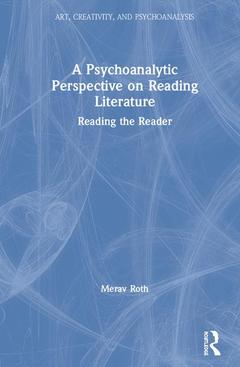A Psychoanalytic Perspective on Reading Literature Reading the Reader Art, Creativity, and Psychoanalysis Book Series
Auteur : Roth Merav

What are the unconscious processes involved in reading literature? How does literature influence our psychological development and existential challenges? A Psychoanalytic Perspective on Reading Literature offers a unique glimpse into the unconscious psychic processes and development involved in reading. The author listens to the 'free associations' of various literary characters, in numerous scenarios where the characters are themselves reading literature, thus revealing the mysterious ways in which reading literature helps us and contributes to our development.
The book offers an introduction both to classic literature (Poe, Proust, Sartre, Semprún, Pessoa, Agnon and more) and to the major psychoanalytic concepts that can be used in reading it ? all described and widely explained before being used as tools for interpreting the literary illustrations. The book thus offers a rich lexical psychoanalytic source, alongside its main aim in analysing the reader?s psychological mechanisms and development. Psychoanalytic interpretation of those literary readers opens three main avenues to the reader?s experience:
- the transference relations toward the literary characters;
- the literary work as means to transcend beyond the reader?s self-identity and existential boundaries; and
- mobilization of internal dialectic tensions towards new integration and psychic equilibrium.
An Epilogue concludes by emphasising the transformational power embedded in reading literature.
The fascinating dialogue between literature and psychoanalysis illuminates hitherto concealed aspects of each discipline and contributes to new insights in both fields. A Psychoanalytic Perspective on Reading Literature will be of great interest not only to psychoanalytic-psychotherapists and literature scholars, but also to a wider readership beyond these areas of study.
Preface
Acknowledgements
Permissions acknowledgements
Introduction: reading the reader
Part I: Transference relations of the literary reader
1: The distancing paradox
2: The bestowal of meaning
3: Seven types of identification
4: Resistance to reading
5: The idealization of the author
6: Mutual witnessing
7: Reparation of the ethical position
Part II: Reading literature as a means of transcendence
8: Transcendence beyond self-identity
9: Transcendence beyond the boundaries of human vulnerability and mortality
Part III: From psychic equilibrium to psychic change: the dialectic forces of literature
10: The dialectic between the present and the absent
11: The dialectic between the familiar and the uncanny
12: The dialectic between the symbolic order and disorder
13: The dialectic between ‘continuous-doing’ and ‘emergent-being’
13a First illustration: Aharon Appelfeld’s The Man Who Never Stopped Sleeping
13b Second illustration: Søren Kierkegaard’s book Fear and Trembling: Dialectical Lyric
13c Third illustration: Otto Dov Kulka’s book Landscapes of the Metropolis of Death
14: Epilogue: the transformative power of reading literature
Index
Merav Roth, PhD is a training analyst and cultural researcher. She is former chair of the postgraduate Klein studies programme and of the doctoral unit for the interdisciplinary psychoanalytic PhD and is currently chair of the psychotherapy programme at the Sackler School of Medicine, Tel-Aviv University, Israel. She co-edited Melanie Klein: Essential Writings Volume II with J. Durban (2013).
Date de parution : 08-2019
15.6x23.4 cm
Disponible chez l'éditeur (délai d'approvisionnement : 14 jours).
Prix indicatif 188,53 €
Ajouter au panierDate de parution : 09-2019
15.6x23.4 cm
Disponible chez l'éditeur (délai d'approvisionnement : 14 jours).
Prix indicatif 59,55 €
Ajouter au panierThèmes d’A Psychoanalytic Perspective on Reading Literature :
Mots-clés :
Young Man; Psychoanalysis; Human Suffering; literature; Common Language; meaning; Existential Philosophers; conscious; Vallejo’s Poem; unconscious; Aharon Appelfeld; significance; Agnon’s Story; identification; Psychoanalyst Donald Winnicott; character; Twinship Transference; resistance; Abraham’s Silence; idealization; Aspern Papers; transcendence; Patient’s Text; mortality; Symbolic Immortality; absence; Transference Relations; madness; Transformative Reading; transformation; Idealizing Transference; psychological mechanisms; Transitional Subject; unconscious psychic processes; Bird’s Eye; literary readers; Kafka’s Story; classic literature; Part III; Poe’s Story; Miss Tita; Freud’s Structural Model; Purloined Letter; Adhesive Identification



